National Museum of Korea
The National Museum of Korea is the flagship museum of Korean history and art in South Korea and is the cultural organization that represents Korea. Since its establishment in 1945,[2] the museum has been committed to various studies and research activities in the fields of archaeology, history, and art, continuously developing a variety of exhibitions and education programs.
| Korean name | |
|---|---|
| Hangul | 국립중앙박물관 |
| Hanja | |
| Revised Romanization | Gunglib Jung-ang Bangmulgwan |
| McCune–Reischauer | Kunglip Chung'ang Pangmulgwan |
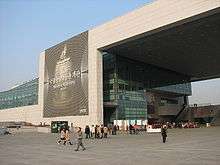 | |
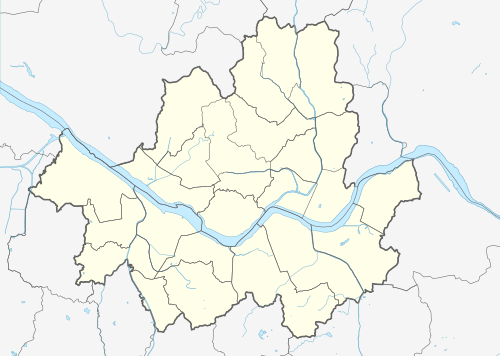 Location within Seoul | |
| Established | 1909 (Reopening of the National Museum of Korea in Yongsan, 2005) |
| Location | 137 Seobinggo-ro, Yongsan-gu, Seoul, South Korea |
| Coordinates | 37.5233°N 126.9797°E |
| Type | History and Art museum |
| Collection size | over 310,000 pieces[1] 295,551 square metres (3.18 million square feet) |
| Visitors | 3,476,606 (2017) |
In 2012, it was reported that since its relocation to Yongsan District in 2005, the museum had attracted an attendance of 20 million visitors, or over 3 million annually which makes it one of the most visited museums in the world and Asia and the most visited in South Korea.[3][4] A poll of nearly 2,000 foreign visitors, conducted by the Seoul Metropolitan Government in November 2011, stated that visiting the museum is one of their favorite activities in Seoul.[5] It is one of the largest museums in Asia.
History
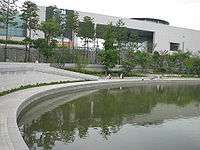
Emperor Sunjong established Korea's first museum, the Imperial Household Museum, in 1909. The collections of the Imperial Household Museum at Changgyeonggung and the Japanese Government General Museum administered during Japanese rule of Korea became the nucleus of the National Museum's collection, which was established when South Korea regained independence in 1945.
During the Korean War, the museum's 20,000 pieces were safely moved to Busan to avoid destruction. When the museum returned to Seoul after the war, it was housed at both Gyeongbokgung and Deoksugung Palace. In 1972, the museum moved again to a new building on the grounds of the Gyeonbokgung Palace. The museum was moved again in 1986 to the Jungangcheong, the former Japanese General Government Building, where it was housed (with some controversy and criticism) until the building's demolition in 1995. In December 1996, the museum was opened to the public in temporary accommodations in the renovated Social Education Hall, before officially reopening in its grand new building in Yongsan Family Park on October 28, 2005.
In October 2005, the museum opened in a new building in Yongsan Family Park in Seoul, South Korea. The museum is situated on what used to be a golf course that was part of the Yongsan Garrison, the central command of the United States Forces stationed in Korea. The US Army returned a part of the land in 1992 to the Korean government, which went on to become the Yongsan Family Park. While the plans for the museum inside the park began in 1993, its opening was delayed repeatedly by a helipad, which was eventually relocated in 2005 by agreement. The museum contains over 310,000 pieces[1] in its collection with about 15,000 pieces on display at one time. It displays relics and artifacts throughout six permanent exhibition galleries such as Prehistory and Ancient History Gallery, Medieval and Early Modern History Gallery, Donation Gallery, Calligraphy and Painting Gallery, Asian Art Gallery, and Sculpture and Crafts Gallery. It is the sixth largest museum in the world in terms of floor space, now covering a total of 295,551 square metres (3,180,000 sq ft).[6] In order to protect the artifacts inside the museum, the main building was built to withstand a magnitude 6.0 Richter Scale earthquake. The display cases are equipped with shock-absorbent platforms. There is also an imported natural lighting system which utilizes sunlight instead of artificial lights and a specially designed air-conditioning system. The museum is made from fire-resistant materials and has special exhibition halls, education facilities, a children's museum, huge outdoor exhibition areas, restaurants, cafes, and shops.
Layout
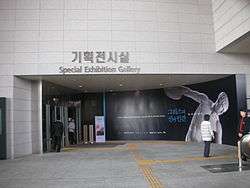
The museum is divided into three floors. Symbolically, the left of the museum is supposed to represent the past, while the right side of the museum represents the future. The ground floor contains parks; gardens of indigenous plants; waterfalls and pools; and a collection of pagodas, stupas, lanterns, and steles (including National Treasure of Korea No. 2, the Great Bell of Bosingak, the exemplar of Korean bells of the Joseon period).
First floor
On the first floor is the Prehistory and Ancient History Gallery, which contains approximately 4,500 artifacts from the Paleolithic to the Unified Silla era excavated from sites across Korea. The nine exhibition rooms in the gallery are the Palaeolithic Room, the Neolithic Room, the Bronze Age & Gojoseon Room, the Proto Three Kingdoms Room, the Goguryeo Room, the Baekje Room, the Gaya Room, and the Silla Room. Ranging from chipped stone handaxes to luxurious ancient royal ornaments, the relics displayed here show the long journey taken by early settlers on the Peninsula towards developing their unique culture.
Artifacts from important prehistoric sites and settlements such the Bangudae Petroglyphs and Songgung-ni are found in the Neolithic and Bronze Age Rooms.
Also on the first floor is the Medieval and Early Modern History Gallery, which showcases the cultural and historical heritage throughout the Unified Silla, Balhae, Goryeo, and Joseon periods. The eight rooms of the gallery include the Unified Silla Room, Balhae Room, Goryeo Room, and the Joseon Room.
Second floor
The second floor contains the Donation Gallery and the Calligraphy and Painting Gallery, which contains 890 pieces of art that showcase the traditional and religious arts of Korea in line and color. The Calligraphy and Painting Gallery is divided into four rooms: the Painting Room, the Calligraphy Room, the Buddhist Paintings Room, and the Sarangbang (Scholar's Studio).
The Donation Gallery holds 800 pieces of art donated from the private collections of collectors. The gallery is divided into eleven rooms: the Lee Hong-kun Collection Room, the Kim Chong-hak Collection Room, the Yu Kang-yul Collection Room, the Park Young-sook Collection Room, the Choi Young-do Collection Room, the Park Byong-rae Collection Room, the Yoo Chang-jong Collection Room, the Kaneko Kazushige Collection Room, the Hachiuma Tadasu Collection Room, the Iuchi Isao Collection Room, and the Other Collection Room.
Third floor
The third floor contains the Sculpture and Crafts Gallery, with 630 pieces that represent Korean Buddhist sculpture and craftwork. Highlights of the gallery include Goryeo Celadon wares and National Treasure of Korea No. 83, Bangasayusang (or Pensive Bodhisattva). The five rooms of the gallery are the Metal Arts Room, the Celadon Room, the Buncheong Ware Room, the White Porcelain Room, and the Buddhist Sculpture Room.
Also on the third floor is the Asian Arts Gallery, which contains 970 pieces that explore the similarities and divergences of Asian art and the confluence of Asian and Western art via the Silk Road. The five rooms are the Indian & Southeast Asian Art Room, the Central Asian Art Room, the Chinese Art Room, the Sinan Undersea Relics Room, and the Japanese Art Room.
Collection
Gold Crown, National Treasure of Korea No. 191
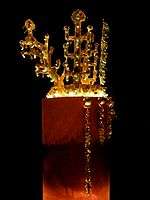
The Fifth-century Silla gold crown was excavated from the North tomb of Hwangnamdaechong in Gyeongju. More ornaments, including a silver belt ornament inscribed (보인대)'Buindae ("Madame's belt"), were found in the North tomb than in the South tomb, suggesting that the North tomb is a woman's. The gold crown reflects the owner's political and social class.
Pensive Bodhisattva (Gilt-bronze Maitreya in Meditation) (National Treasure No. 83)
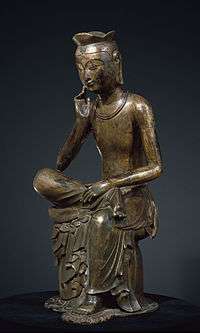
This Bodhisattva, from the early Seventh-century, sits with one leg over the other, lost in thought with fingers on its cheeks. The pose is derived from that of the Buddha contemplating the life of human beings. This statue wears a flat crown called the 'Three Mountain Crown' or 'Lotus Crown.' The torso is naked, adorned by a simple necklace. There are remarkable similarities with the wooden Pensive Bodhisattva at the Koryuji Temple in Kyoto, Japan, which is believed to have been founded by a Silla monk. It is likely, then, that this statue was created in Silla. The well-balanced shape, however, and elegant and refined craftsmanship is typical of the Baekje period.
Incense Burner, Celadon with Openwork, National Treasure of Korea No. 95
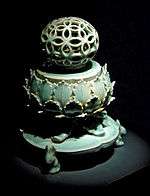
This Twelfth-century incense burner represents some of the best quality Goryeo celadon. It is composed of a cover (with a central hole for releasing incense), a burner, and a support. Above the hole for incense is a curved knob with a Seven Treasure design incised to aid the release of scent.
Ten-Story Pagoda from Gyeongcheonsa Temple, National Treasure of Korea No. 86
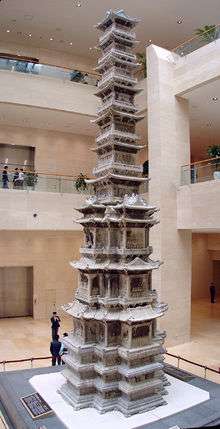
The "Gyeongcheonsa Ten-Story Pagoda" (경천사 십층석탑, 敬天寺十層石塔) was originally erected at the monastery Gyeongcheonsa in the fourth year (1348) of King Chungmok of Goryeo. In 1907, it was illegally smuggled to Japan by a Japanese court official, but was returned in 1918 at the behest of British and American journalists, E. Bethell and H. Hulbert. In 1960, it was restored to Gyoengbokgung Palace, but proved difficult to conserve because of acid rain and weathering. So, it was dismantled again in 1995, to be housed inside in the National Museum of Korea's 'Path to History' when the museum reopened in 2005.
Album of Genre Painting by Danwon, Treasure of Korea No. 527
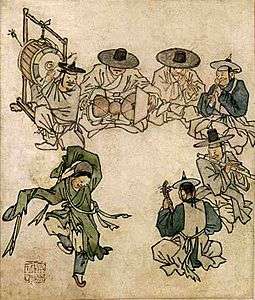
The Eighteenth-century painter Kim Hong-do, also known as Danwon, is known for his humorous and candid paintings of the lives of common people. This album consists of twenty-five paintings, each focusing on figures without background features. Kim's paintings appear sketchy, yet show expressive brush strokes and balanced composition. It is presumed that this style arose in Kim's late 30s, the album being completed when he was about 40 years old. [7]
The Oegyujanggak Uigwe
Gyujanggak was a royal library established on the grounds of Changdeokgung Palace in the capital by order of King Jeongjo, the 22nd ruler of the Joseon, in 1776. Over time, the library also developed into a state-sponsored research institution. In 1782, a royal library annex called Oegyujanggak was established on Gangwha Island to preserve important documents related to the royal family more systematically and securely than possible in the capital. Oegyujanggak housed copies of writings, calligraphy, and drawings by former kings as well as the royal genealogies, uigwe, and other such items. As such it was a repository of royal family culture. It includes records of the preparations for state-sponsored events and ceremonies involving key members of the Joseon royal family. The text explains every process in detail and is supported by illustrations elaborately drawn by hand. These served as references for later generations organizing similar ceremonies or events. The Uigwe began to be produced in the 15th century, during early Joseon, and the practice continued to the end of the kingdom in the early 20th century. They preserve core elements of Confucian culture, which revered ritual and propriety. These works also show the governing philosophy and systems by which the Joseon state was run. Their historical and cultural value has been recognized globally, as the “Royal Protocols of Joseon Dynasty”* were inscribed into the UNESCO Memory of the World Register in 2007. [8] Two hundred and ninety-seven volumes of the Protocols that were looted in 1866 during the French campaign against Korea were kept at the Bibliothèque nationale de France. They were repatriated in April and June 2011 in four separate installments.[9] A special exhibition, The Return of the Oegyujanggak Uigwe from France: Records of the State Rites of the Joseon Dynasty, was held from 19 July to 18 September 2011.[10] In June 2011, before of the exhibition, the museum showcased five copies of the records to the media, along with the silk covers of other volumes.[11]
References
- "Director's Message | About the Museum | 국립중앙박물관". Museum.go.kr. Archived from the original on 2010-11-17. Retrieved 2014-03-28.
- "Seoul's best museums" Archived 2012-09-28 at the Wayback Machine CNN Go. 27 October 2011. Retrieved 2011-11-03
- Visitor Figures 2013: Museum and exhibition attendance numbers compiled and analysed, The Art Newspaper, International Edition, April 2014.
- "National Museum of Korea Welcomes 20-Millionth Visitor since Its Relocation to Yongsan". Archived from the original on 2013-02-18. Retrieved 2012-11-08.
- "Mt. Nam Tops List of Foreign Tourists' Favorites". Chosun Ilbo. 28 November 2011. Retrieved 23 April 2012.
- "Site Map | 국립중앙박물관". Museum.go.kr. Archived from the original on 2013-12-20. Retrieved 2014-03-28.
- [100 Highlights of National Museum of Korea, book]
- "Site Map | 국립중앙박물관". Museum.go.kr. Archived from the original on 2014-03-28. Retrieved 2014-03-28.
- Lee, Claire "Ancient Korean royal books welcomed back home" Korea Herald. 6 December 2011. Retrieved 2012-04-23
- "The Return of the Oegyujanggak Uigwe from France: Records of the State Rites of the Joseon Dynasty". Special Exhibitions. National Museum of Korea. Archived from the original on 7 April 2014. Retrieved 23 April 2012.
- Lee, Claire (4 July 2011). "Museum shows royal books returned from France". Korea Herald. Retrieved 23 April 2012.